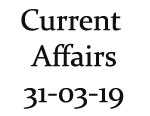-
Current Affairs 31st March 2019
Updated : 31-Mar-2019
Current Affairs 31st March 2019 - Important Points
- EU banned single use plastics on - 28th March 2019
- UNSC Resolution against terrorist funding on - 28th March 2019
- RBI Allows Non-Residents to Participate In - Rupee Interest Rate Derivatives Market
- Brunei to make gay sex punishable with death from - 3rd April 2019
Current Affairs 31st March 2019 - Details
EU bans single use plastics on - 28th March 2019
European Parliament on March 28th, 2019 has voted to prohibit single-use plastic items. It comprises plastic cutlery, cotton buds, straws and stirrers as part of a sweeping law against plastic waste that despoils beaches and pollutes oceans. At the sitting in Strasbourg, 560 Members of European Parliament nominated in favour of the recent pact hammered out with European Union ministers, 35 against, with 28 abstentions.
Important Highlights- EU member states will have to announce measures to minimise the usage of plastic food containers and plastic lids for hot drinks.
- By 2025, plastic bottles should be made of 25 percent recycled content, and by 2029 90 percent of them should be re-used.
- Wet wipes, sanitary towels, tobacco filters and cups will be characterized if they are made with plastic.
- Packaging will warn clients of environmental damage they do by disposing of these items imperfectly.
- The ‘polluter pays’ principle will be protracted to producers of fishing nets so that organisations only pay the cost of nets lost at sea.
UNSC Resolution against terrorist funding on - 28th March 2019
The UN Security Council on March 28th, 2019 consistently approved the 1st-ever resolution to suppress the funding of terror groups universally.
Highlights of the Resolution- The ‘Resolution 2462 on Countering the Financing of Terrorism’ evidently states that all the member states shall ensure to start laws and regulations regarding funding to terrorist groups / individual/criminals a serious criminal offence.
- The resolution joins all the earlier resolutions to form a consolidated document for strong collaboration and targeted efforts against terrorism. It also calls on member states to form financial intelligence units.
- Members that failed to execute the United Nations Security Council resolution, would face United Nations sanctions.
Directions for UN Office of Counter-Terrorism - The resolution guides the United Nations Office of Counter-Terrorism, formed in 2017, to device global counter-terrorism strategy to play a leading role in recognizing ways to suppress terrorist financing.
- Expanding the emphasis of United Nations Office of Counter-Terrorism to cover intelligence sharing, risk assessments and public-private partnerships (PPPs).
- System-wide alertness and development of a comprehensive approach.
- Work closely with the Financial Action Task Force, which is an inter-governmental group which forms standards for fighting against money laundering, terrorist financing and related threats to the integrity of international finance system.
RBI Allows Non-Residents to Participate In - Rupee Interest Rate Derivatives Market
The Reserve Bank of India permitted non-residents to participate in the rupee interest rate derivatives
market. This decision was accepted with a view to deepening the rupee interest rate swap market.
With this decision, non-residents of India can undertake rupee interest rate derivative transactions on
authorised stock exchanges, electronic trading platforms and over the counter markets.
RBI’s decision
A non-resident Indian will be permitted to undertake transactions in the rupee interest rate derivatives
markets to hedgerow an exposure to rupee interest rate risk and other quantified purposes.
Foreign portfolio investors, collectively, can manage in interest rate futures up to an edge of net long
position of Rupees 5000 crore.
Reserve Bank of India, in its 1st bi-monthly policy for 2018-19 in April, declared to provide access to non-residents into the interest rate swap market with an idea to upsurge participation in the domestic market.Brunei to make gay sex punishable with death from - 3rd April 2019
At a time when nations worldwide are liberalizing laws especially concerning the LGBTQ community, Brunei which is a small Southeast Asian nation, declared the implementation of a strict Sharia law, under which those found guilty of adultery/gay sex would be endangered to death by stoning from April 3rd, 2019.
The harsh Islamic law had been put on embrace for Four years amidst heavy criticism. Brunei had 1st
declared its introduction in 2013, which occasioned in vast international protest. After the hullabaloo,
Brunei, a sultanate of about 430000, had behind carrying out the harshest provisions of its Shariah law.
Crucial Highlights- The nation has now, quietly finalised to execute the harsh punishment beginning April 3rd, 2019.
- While homosexuality was already prohibited in Brunei, with a punishment of up to 10 years in prison, the new laws will make it a capital offence and permit penalties including whipping and stoning.
- Brunei had the death disadvantage on the books ever since it was a British colony, but in practice,
executions were never typically carried out. - Besides recommending death by stoning for gay sex, the fresh laws recommend amputation of hand/feet as a punishment for robbery. The penalty would be subtraction of the right hand for 1st-time offenders, and the left foot for a 2nd offence.
- Under the fresh laws, a person can be sentenced of adultery/having gay sex only if there are multiple Muslim observers.
- The law will be applicable to Muslims and non-Muslims alike, although some offenses, such as apostasy, smear specifically to Muslims, who make up about 2/3rds of Brunei’s population.














